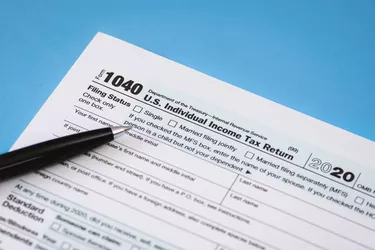
Amidst the junk and bills that might flood your mailbox, your income tax refund check could be among the envelopes you overlook. And when you finally decide to sort through old mail and discover you received your refund check, you might wonder if your long-awaited tax return check expired. Unless you take an extraordinarily long time to sift through a pile of mail, it's likely you can still cash the check or deposit it into your bank account.
Providing Your Information
Video of the Day
IRS tax refund checks are based on you filing an accurate business or personal income tax return. When you paid more taxes to the government than you owe, you are due a refund. Through your income tax filings, and your earnings and payments recorded in the government's system, the IRS knows precisely how much you owe – or how much the government owes you, in this case.
Video of the Day
Understanding the IRS Tax Return Process
Whether you file a paper income tax return or submit an electronic refund, processing your return can take up to six weeks for the IRS to complete. That's without any mathematical errors or questions about the deductions or exemptions that you claim.
It's a good idea to track the processing of your return so you know when to expect payment. If you are tracking the progress of your return, you can better estimate when you might receive your check. The IRS makes it easy for taxpayers to track progress in three stages. The first stage is the IRS provides information on when your return was received, followed by when it has been approved, and the final stage is the date on which the refund is mailed to you. If you choose to use tax preparation organizations to file your income tax returns, the process is the same and the progress is the same.
IRS Check Differences
The Uniform Commercial Code (UCC) contains the rules and regulations for U.S. commercial transactions. Based on the UCC, most bank checks, including payroll checks, are good for six months. Some checks even have a notation that indicates the check must be cashed before the 90-day mark.
IRS checks are a different. Because your tax return check isn't a commercial transaction, your tax return check is good for longer than six months. IRS tax return checks are good for one year.
Discovering Your Tax Return Check Expired
When you have regularly checked the progress of your IRS tax return and are expecting your check, there's a chance you might have missed the check or overlooked it in your mail. In this case, if you happen to find the check and it's been a year since the IRS processed your return and sent the check, contact the IRS to request that your expired tax refund check be reissued.
IRS tax return checks are issued by the U.S. Department of Treasury. Access the National Payment Integrity and Resolution Center for instructions on how to get your expired tax refund check reissued. Once you have completed the steps, you can check by phone on the progress of your check reissue claim. Your claim will be based on the tax refund check being "stale," which is the same as expired.
Avoiding Future Problems With IRS Tax Refund Checks
The easiest way to avoid income tax refund check problems is to establish a bank account that accepts electronic fund transfers. For future income tax filings, the government will gladly deposit your income tax check into a bank account.
If you choose this route, double-check that you provide the correct routing and account numbers for your checking or savings account when filing your tax return. Doing so simplifies matters and can significantly decrease the chances for error. The best part, however, is that you will likely get your money sooner because the IRS process for the automatic deposit of funds is shorter than the time frame for mailed checks.